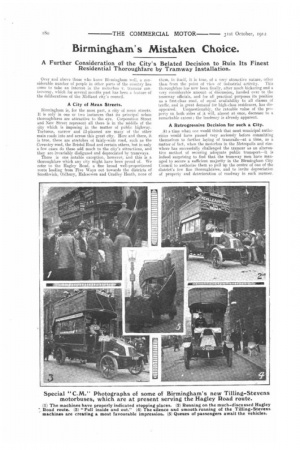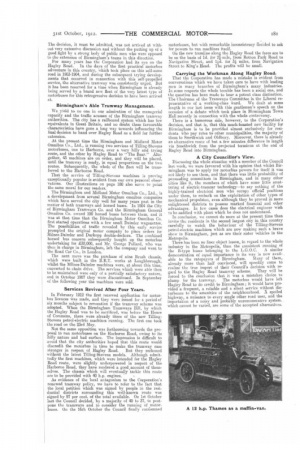Birmingham' s Mistaken Choice.
Page 4

Page 5

If you've noticed an error in this article please click here to report it so we can fix it.
A Further Consideration of the City' s Belated Decision to Ruin Its Finest Residential Thoroughfare by Tramway Installation.
Over and above those. who know Birmingham well, a considerable. number of people in other parts of the country has come to take an interest in the motortins v. tramcar controversy, which for several months past has been a feature of the deliberations of the Midland city's council.
A City of Mean Streets.
Birmingham is, for the most part, a city of mean streets. It is only in one or two instances that its principal urban thoroughfares are attractive to the eye. Corporation Street and New Street represent all there is in the middle of the city which is imposing in the matter of public highway. Tortuous, narrow and ill-planned are many of the other main roads into and across this great city. Here and there, it is true, there are stretches of fairly-wide road, such as the Coventry road, the Bristol Road and certain others, but in only afew eases do these add much to the city's attractions, and they are invariably disfigured and depreciated by tramways.
There is one notable exception, however, and this is a thoroughfare which any city might have been proud of. We refer to the Bagley Road. a fine broad well-proportioned route leading from Five Ways out towards the districts of Smethwick, Oldbury, Halesowen and Cradley Heath, none of them, in itself, it is true, of a very attractive nature, other than from the point of view of industrial activity. This thoroughfare has now been finally, after much bickering and a very considerable amount: of discussion, handed over to the tramway officials, and for all practical purposes its position as a first-class road, of equal availability to all classes of traffic, and in great demand for high-class residences, has dis appeared. Unquestionably, the rateable value of the property on both sides of it will, almost at once, decrease to a. remarkable extent-; the tendency is already apparent..
A Retrogressive Decision for such a City.
At a time when one would think that most municipal authorities would have paused very seriously before committing themselves to further laying of tranirails---at a time, as a matter of fact, when the motorbus in the Metropolis and elsewhere has successfully challenged the tramcar as an alternative method of securing adequate public transport—it is indeed surprising to find that. the tramway men have managed to secure a sufficient majority in the Birmingham City Council to authorize them to pull up the centre of one of the district's few fine thoroughfares, and to invite depreciation of property and deterioration of roadway in such manner.
The decision, it must be admitted, was not arrived at without very extensive discussion and without the putting up of a good fight by a strong body of public men who were opposed to the extension of Birmingham's trams in this direction. For many years has the Corporation had its eye on the Hagley Road. In the days of the first practical motorbus adventure in this country, which took place on this self-same road in 1903-1904, and during the subsequent trying developments that occurred in connection with this self-propelled service, the alternative tramway was consistently urged. But it has been reserved for a time when Birmingham is already being served by a brand new fleet of the very latest type of motorbuses for this retrogressive decision to have been arrived at.
Birmingham's Able Tramway Management.
We yield to no one in our admiration of the managerial capacity and the traffic acumen of the Birmingham tramway witheritica. The city has a railboond system which has few equivalents in Great Britain, and no doubt these favourable characteristics have gone a long way towards influencing the final decision to hand over Hagley Road as a field for further extension.
At the present time the Birmingham and Midland Motor Omnibus Co., Ltd., is running two services of Tilling-Stevens motorbuses, one to Harborne, over a very hilly and trying route, and the other by Hagley Road to "The Bear." Altogether, 43 machines are on order, and they will be placed, until the tramway is ready, in equal proportions on the two routes. Subsequently, the" whole of the fleet will be transferred to the Harborne Road.
That the service of Tilling-Stevens machines is proving exceptionally popular is evident from our own personal observations. Our illustrations on page 180 also serve to point the same moral for our readers.
The Birmingham and Midland Motor Omnibus Co., Ltd., is a development from several Birmingham omnibus companies which have served the city well for many years past m the matter of both tramways and horsed buses. In 1904 the City of Birmingham Tramways Co. and the Birmingham General Omnibus CO. owned 100 horsed buses between them, and it was at that time that the Birmingham Motor Omnibus Co. first started operations with a few small Daimler wagonettes. The possibilities of traffic revealed by this early service prompted the original motor company to place orders for Milnes-Daimler and Durkopp double-deckers. The combined horsed bus concern subsequently bought up the motorbus undertaking for £32,000, and Mr. George Pollard, who was then in charge in Birmingham, left the company and went to the Road Car Co., in London.
The next move was the purchase of nine Brush chassis, which were built in the B.E.T. works at Loughborough, whilst the Milnes-Daimler machines were, at about this time, converted to chain drive. The services which were able then to be maintained were only of a partially satisfactory nature, and in October 1907 they were discontinued. In September of the following year the machines were sold.
Services Revived After Pour Years.
In February 1912 the first renewed application for motorbus licences was made, and they were issued for a period of six months subject to revocation if the tramway scheme was adopted. When the Birmingham Tramways Bill, by which the Hagley Road was to be sacrificed, was before the House of Commons, there were already three of the new TillingStevens petrol-electric machines running. The first one took the road on the 23rd May.
Not the same opposition was forthcoming towards the proposal to run motorbuses on the Harborne Road, owing to its hilly nature and bad surface. The impression is difficult to avoid that. the city authorities hoped that this route would discredit the motorbus in time to make the tramway case stronger in respect of liagley Road. But they reckoned without the latest Tilling-Stevens models. Although admittedly the first machines, which were intended for the Hagley Road route, were slightly underpowered in respect of the Harborne Road, they have rerdered a goodl,account of themselves. The chaseis which will eventually tackle this route are to be provided with 40 h.p. engines.
As evidence of the local antagonism to the Corporation's renewed tramway policy, we have to refer to the fact that the local petition which was signed by people in the residential districts surrounding this well-known route was signed by 97 per cent, of the total available. On 1st October last the Council decided, by a majority of 40 to 37, to postpone the tramways and to consider the running of motorbuses. On the 16th October the Council finally condemned motorbuses, but with remarkable inconsistency decided to ask for powers to run machines itself. On the new tramline along the Hagley Road the fares are to be on the basis of 1d. for 2-mile, from Rotten Park Road to Navigation Street, and 1ad. for 31 miles, from Navigation Street to King's Head. The profits will be small.
Carrying the Workman Along Hagley Road.
That the Corporation has made a mistake is evident from conversations which we have taken care to have with leading men in many branches of Birmingham's many industries. In some respects the whole trouble has been a social one, and the question has been made to bear a potent class distinction. The Chairman of the Tramways Committee is the Liberal re presentative of a working-class -limed. We dealt at some length in our last issue with this gentleman's speech on the occasion of a debate which took place in Birmingham Town Hall recently in connection with the whole controversy.
There is a humorous side, however, to the Corporation's decision, and that is, that this much-boasted new facility for Birmingham is to be provided almost exclusively for residents who pay rates to other municipalities, the majority of them to Smethwick and Oldbury. Moreover, there is already an alternative route of but a few minutes difference in length via Smethwick from the projected terminus at the end of Hagley Read into Birmingham.
A City Councilor's View.
Discussing the whole situation with a member of the Council last week, we were favoured with his opinion that whilst Birmingham was to apply for rootorlius powers for itself it was not likely to use them, and that there was little probability of persuading committees in Birmingham, and in many other cities like it, the members of which have some little smattering of electric-tramcar technology—to say nothing of the highly-trained electrical men who occupy official positions under them, to embark on the exploitation of other types of mechanical propulsion, even although they be proved in more enlightened districts to possess marked financial and other advantages. In few cases does the electrical engineer wish to be saddled with plant which lie does not understand.
In conclusion, we eannot do more at the present time than invite the residents in the second largest city in this country carefully to watch the behaviour of the Tilling-Stevens petrol-electric machines which are now making such a brave show in Birmingham, just as are their sister vehicles in the Metropolis. There has been no finer object lesson, in regard to the whole industry in the Metropolis, than the consistent running of the fatype buses belonging to the L.G.O.C. A similar demonstration of equal importance in its way is now avail,
able to the ratepayers of Birmingham. Afany of them, already more than half convinced, will speedily come to realize the true import of their Council's decision with regard to the Hagley Road tramway scheme. They will be forced to the conclusion that it, was a mistaken choice to plump for the tramway. The motorbus would have left Hagley Road to do credit to Birmingham; it would have provided, a frequent, a reliable and a silent service without disturbance to the amenities of the neighbourhood. A spoiled highway, a nuisance to every single other road user, and the importation of a noisyand probably unremunerative system. which cannot be varied, are some of the accepted alternatives.




















